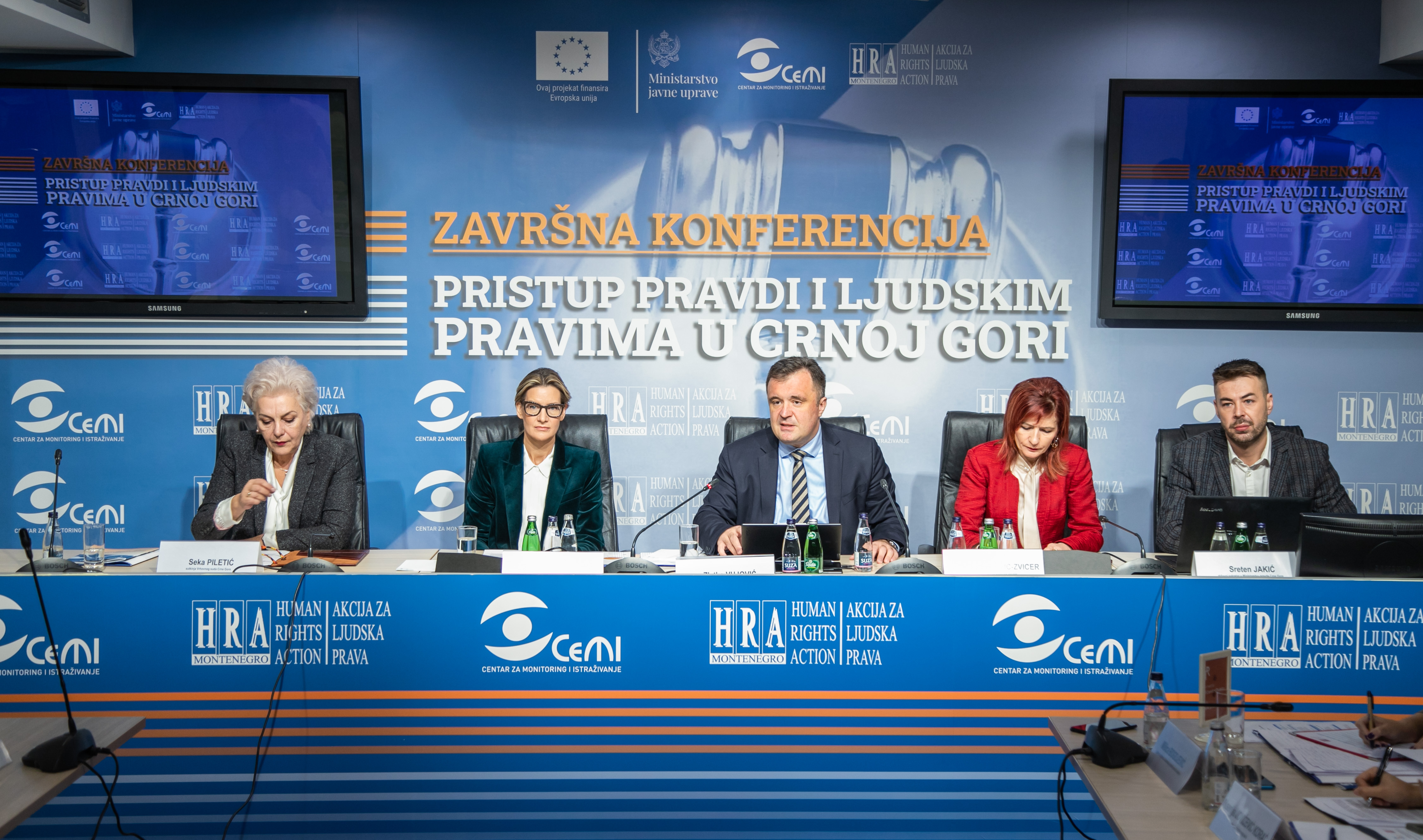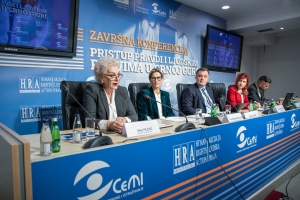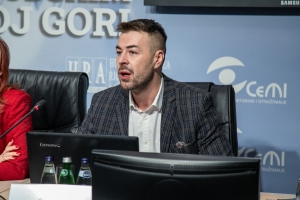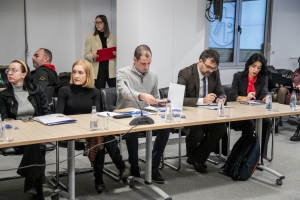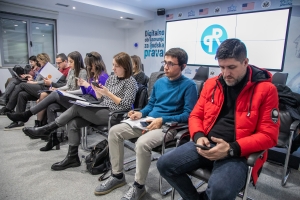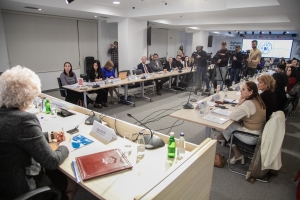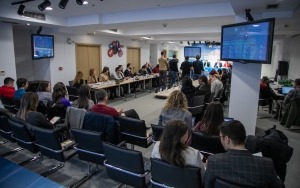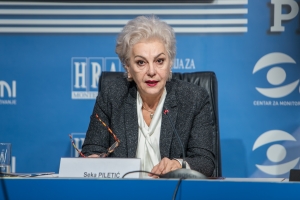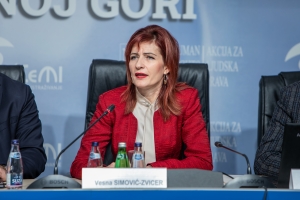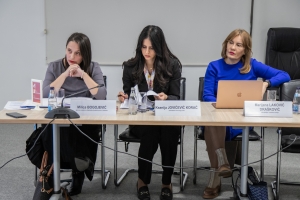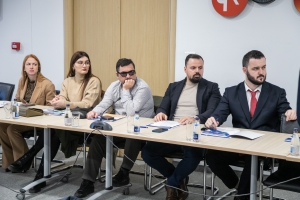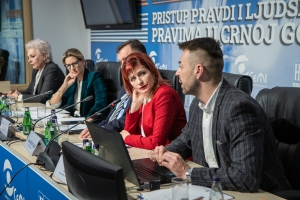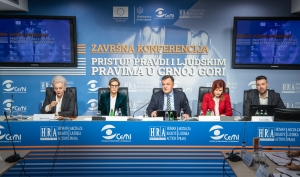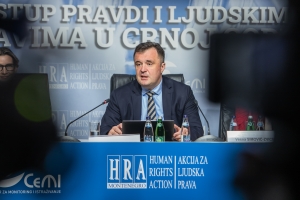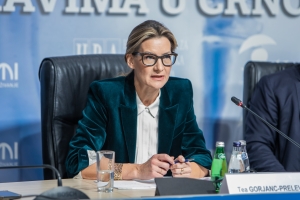In Montenegro's judiciary, currently, one-fifth of the judges are missing, and a serious problem is the lack of political will to pass key laws and make essential appointments in the judiciary. This was announced during the opening statements at the final conference "Access to Justice and Human Rights in Montenegro," organized by the Center for Monitoring and Research (CeMI).
Zlatko Vujović, President of the Governing Board of CeMI , stated that Montenegro aspires to become a full member of the EU, emphasizing that this requires significant efforts in judicial reform. He mentioned delays in legal proceedings, lack of resources, and uneven application of laws as some of the issues highlighted by the European Commission, indicating the inefficient functioning of the Montenegrin judicial system.
Vujović emphasized the noticeable lack of alignment with European standards and legal heritage. In recent years, a serious problem in the judiciary has been the deficit in political will to pass key laws in the field of justice and make crucial appointments in the judiciary, including the selection of the Chief State Prosecutor and members of the Judicial Council.
Speaking about the project "Access to Justice and Human Rights in Montenegro," Vujović explained that its primary goal is to promote democratic values in Montenegro by strengthening the foundations of the rule of law, expanding the culture of respecting human rights, and enhancing the role of civil society as a catalyst in promoting human rights, with a special emphasis on access to justice and the rule of law.
"One of the key activities of the project was monitoring legal proceedings, focusing only on criminal cases. The significance of this type of monitoring lies in contributing to increased transparency and improvement of judicial processes. Through careful and systematic data collection, monitoring legal proceedings allows for in-depth analysis and identification of key issues in the functioning of the courts, leading to potential improvements," stated Vujović.
He added that numerous activities were conducted during the project implementation, including seven analyses and reports prepared in collaboration with the Human Rights Action (HRA).
Representative of the Supreme Court, judge Seka Piletić mentioned that the same recommendations regarding the functioning of the judiciary have been repeated for years, causing concern but not discouragement. She highlighted issues such as the excessive duration of legal proceedings, the poor state of information and communication infrastructure, inadequate security measures in courts, and the inaccessibility of a significant number of courts to persons with disabilities, all of which were identified in CeMI's report.
Piletić pointed out that one of the causes of such a situation is the untimely filling of vacant judicial positions. She stated that this directly undermines the efficiency of the judicial system and poses a serious challenge to maintaining the rule of law. Piletić acknowledged that the working conditions for judges are not at an optimal level, and the lack of spatial capacity contributes to frequent delays and hearings held in inadequate offices, limiting public access to court proceedings.
She emphasized that the Supreme Court pays special attention to protecting the right to a trial within a reasonable time, which continues to be a challenge and one of the most frequently violated human rights in Montenegro.
The President of the Judicial Council, Vesna Simović-Zvicer, stated that the Judicial Council provided suggestions and comments on CeMI's analysis during the analysis development. "It is important to emphasize the project's goals, which involve monitoring procedures from the perspective of the ultimate goal, which is access to justice. I particularly liked that the focus was on vulnerable social groups and their access to justice," said Simović-Zvicer. She expressed her belief that the conclusions identified by CeMI as crucial would assist representatives of the Judicial Council in the working group for amending the Law on the Judicial Council and other regulations, aiming to enhance the legislative framework.
Sreten Jakić, State Secretary in the Ministry of Justice of Montenegro, provided information on activities related to Chapters 23 and 24 of the EU accession process. He reminded that the formation of working groups has been completed.
"In the Ministry of Justice, we have diligently completed the part of the working groups related to the Law on the Judicial Council and Judges, and next week, a working group will begin in that context. It is crucial to mention inclusivity as a novelty. In the earlier period, we concluded that judges from lower courts and prosecutors from lower prosecutor's offices were not included in the working groups. We have changed that, and now everyone is involved in the process," stated Jakić.
Tea Gorjanc-Prelević, Executive Director of the Human Rights Action (HRA), highlighted the challenging situation in the Montenegrin judiciary, stating that it currently lacks one-fifth of its judges. She provided specific examples, noting that the Basic Court in Berane is burdened with an overwhelming caseload, with a judge handling 911 cases on average. This indicates an increased workload of 117 cases per judge. In the courts in Žabljak, there are no judges, and in the Basic Court in Herceg Novi, only two judges are presiding.
Gorjanc-Prelević criticized the Judicial Council, stating that it took them five months without a justifiable reason to allocate selected candidates for judgeships. She expressed concern about the lack of urgency in the judicial system, particularly criticizing the testing commission of the Judicial Council for delaying the testing of judges for two to three months after the conclusion of the application process. Gorjanc-Prelević emphasized the need for all stakeholders to do more to improve efficiency in the courts.
She pointed out that many citizens are forced to delay vital life matters, both in civil cases and in terms of property rights and criminal proceedings, due to these issues. Gorjanc-Prelević underscored the significant responsibility on the Ministry of Justice to facilitate quality and rapid legislative changes, shorten excessively long training periods, and make the judiciary more effective. She specifically mentioned the need for amendments to the Law on Administrative Disputes, as the Administrative Court is overwhelmed with cases.
The project "Access to Justice and Human Rights in Montenegro – Trial Monitoring Project 2021-2023" is conducted by the Center for Monitoring and Research (CeMI) in collaboration with the Human Rights Action (HRA). The project is funded by the European Union and co-financed by the Ministry of Public Administration of Montenegro.
